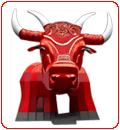|
Interpretation
The proverb "Like a bull in a china shop"
is a vivid expression used to depict someone who exhibits extreme
carelessness, clumsiness, or disruptive behavior, often resulting in
damage or chaos. Its etymology can be traced back to the 17th century,
during a time when cattle were frequently brought to the market in
London. On occasion, these cattle would accidentally wander into
neighboring china shops, where delicate and breakable chinaware was
sold. Due to their large size and strength, the bulls would
unintentionally knock over and shatter the fragile merchandise, causing
significant damage.
The imagery of a bull, known for its sheer power and lack of
gracefulness, amidst a setting as delicate as a china shop, emphasizes
the stark contrast between the two elements. The proverb thus serves as
a metaphorical representation of an individual whose actions resemble
those of a bull let loose in an environment that demands careful
handling and consideration. By evoking this mental image, the proverb
conveys a strong sense of recklessness, lack of control, and the
potential for unintended consequences.
It has found its way into common usage, with various contexts in which
it can be applied. One such context is when describing a person who
exhibits physical clumsiness or lack of spatial awareness. For instance,
the expression can be employed to describe a newcomer who inadvertently
causes a series of mishaps by knocking over objects or stumbling into
delicate surroundings.
Furthermore, the proverb can be extended beyond its literal meaning to
portray individuals who are disruptive or aggressive in situations that
require sensitivity and tact. For instance, during a heated debate or a
sensitive negotiation, if someone behaves in an overly confrontational
or insensitive manner, disregarding the emotions and perspectives of
others, they may be likened to a bull in a china shop. In this
figurative sense, the proverb highlights the impact of the person's
disruptive behavior on the fragile dynamics of the situation,
potentially causing harm, discord, or the shattering of carefully
cultivated relationships. |


